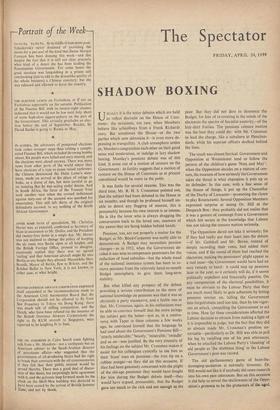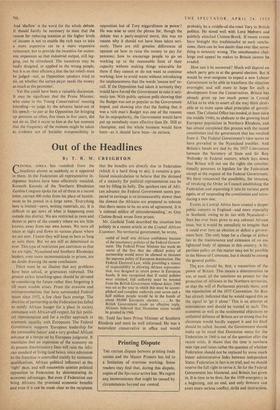SHADOW BOXING
USUALLY it is the noisy debates which are held to reflect discredit on the House of Com- mons : the occasions, not rare, when Members behave like schoolboys from a Frank Richards ' story. But sometimes the House—or the two parties which now dominate it—is even more de- pressing in tranquillity. A club atmosphere settles in; Members congratulate each other on their good sense and moderation, or indulge in lazy shadow boxing. Monday's pensions debate was of this kind. It arose out of a motion of censure on the Government : its futility suggests that a motion of censure on the House of Commons as at present constituted would be more to the point.
It was futile for several reasons. This was the third time, Mr. R. H. S. Crosssman pointed out, that the subject had been debated in the House in six months; and though he professed himself un- able to detect any flagging of interest, this is presumably because his own interest is so intense. He is like the lover who is always dragging the conversation back to the loved one, unaware of the yawns that are being hidden behind hands.
Pensions, too, are not properly a matter for the Budget, as Mr. Boyd-Carpenter was easily able to demonstrate. A Budget may necessitate pension changes—as in 1952, when the Government de- cided it was wise to compensate pensioners for the reduction of food subsidies—but the whole trend of the national insurance system has been to re- move pensions from the relatively hand-to-mouth Budget atmosphere, to give them long-term stability.
But what killed any prospect of the debate providing a serious contribution to the store of national knowledge on pensions was that it was so obviously a party manoeuvre, and a feeble one at that. Mr. Crossman, again, in his enthusiasm may be able to convince himself that the more airings the subject gets the better—just as, in a contro- versy with Taper in these columns a few weeks ago, he convinced himself that the language he had used about the Government's Pensions Bill— 'utterly intolerable,' beastly,"miserable,"swindle' and so on—was justified. By the very intensity of his feelings on the subject Mr. Crossman makes it easier for his colleagues cynically to use him as their 'front' man on pensions—the iron tip on a rubber assegai—as they did on this occasion. If they had been genuinely concerned with the plight of the old-age pensioner they would have fought for him during the Budget debate itself—they would have argued, presumably, that the Budget gave too much to the rich and not, enough to the
poor. But they did not dare to denounce the Budget, for fear of re-creating in the minds of the electorate the spectre of Socialist austerity—of the hair-shirt Forties. The pensions censure motion was the best they could do: with Mr. Crossman to lead the charge, like a subaltern at Passchen- daele, while his superior officers skulked behind the lines.
The result was almost farcical. Government and Opposition at Westminster tend to follow the pattern of the children's game 'Nuts and May' : when the Opposition decides on a motion of cen- sure, the measure of how seriously the Government takes the threat is what champion it puts up as its defender. In this case, with a fine sense of the fitness of things, it put up the Chancellor of the Duchy of Lancaster—promoting the clown to play Rosencrantz. Several Opposition Members expressed surprise at seeing Dr. Hill at the Despatch Box : they probably did not realise that it was a gesture of contempt from a Government which felt secure in the knowledge that Labour was not taking the censure motion seriously.
The Opposition dared not take it seriously; for if they had really put their heart into the debate —if Mr. Gaitskell and Mr. Bevan, instead of simply recording their votes, had added their voices, and if the sound of them had reached the electorate, making the pensioners' plight appear as a real issue—the Government would have had an easy remedy to hand : it could step up pensions later in the year, as it certainly will do, if it seems politically expedient and financially possible. On any computation of the electoral possibilities, it must be obvious to the Labour Party that they are much more likely to gain adherents by letting pensions simmer on, lulling the Government into forgetfulness until too late, than by too vigor- ous an attack, compelling the Government to act in time. How far these considerations affected the Labour decision to abstain from making a fight of it is impossible to judge; but the fact that they did so abstain made Mr. Crossman's position un- enviable—particularly as Dr. Hill was able to pull his leg by recalling one of his past utterances, when he attacked the Labour Party's 'cheating' of old people as 'the shabbiest thing' in the Labour Government's post-war record.
The old parliamentary game of hunt-the- damaging-quotation is normally tiresome; Dr. Hill would not like it if anybody did some research into his own past utterances. But on this occasion it did help to reveal the shallowness of the Oppo- sition's pretence to be the protectors of the aged. And 'shallow' is the word for the whole debate. It should hardly be necessary to state that the reason for reducing taxation at the higher levels of income is not to enable the rich man to take a more expensive car to a more expensive restaurant, but to provide the incentive for econo- mic expansion so that industrial output, still lag- ging, can be stimulated. The incentives may be badly designed, or applied to the wrong people, but it is on their efficiency.that the tax reliefs must be judged—not, as Opposition speakers tried to do, on whether the surtax-payer needs the money as much as the pensioner.
Yet this could have been a valuable discussion. It may be significant that the Prime Minister, who came to the Young Conservatives' meeting intending—to judge by the advance hand-out of his speech—to jeer at the Opposition for bringing up pensions so often, five times in five years, did not do so. Did it occur to him at the last moment that the frequency of the motions might be taken as evidence not of Socialist irresponsibility in opposition but of Tory niggardliness in power? He was wise to omit the phrase for, though the debate was a party-inspired move, this was no reason why it should not have been taken seri- ously. There are still genuine differences of opinion on how to raise the money to pay for pensions; how to encourage people to go on working up to the reasonable limit of their capacity without making things miserable for them if they cannot or do not want to continue working; how to avoid waste without introducing the unpleasantness that the words 'means test' re- call. If the Opposition had taken it seriously they would have forced the Government to take it seri- ously too. With public opinion polls showing that the Budget was not as popular as the Government hoped, and showing also that the feeling that it was a rich man's Budget was one of the reasons for its unpopularity, the Government would have put up somebody more effective than Dr. Hill as champion, and the whole business would have been—as it should have been—in earnest.







































 Previous page
Previous page